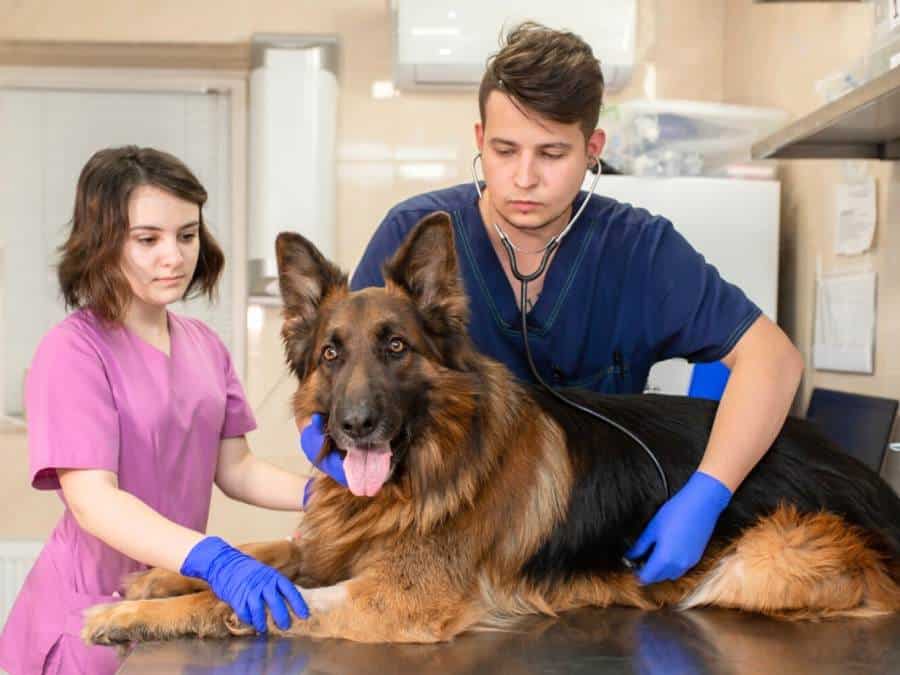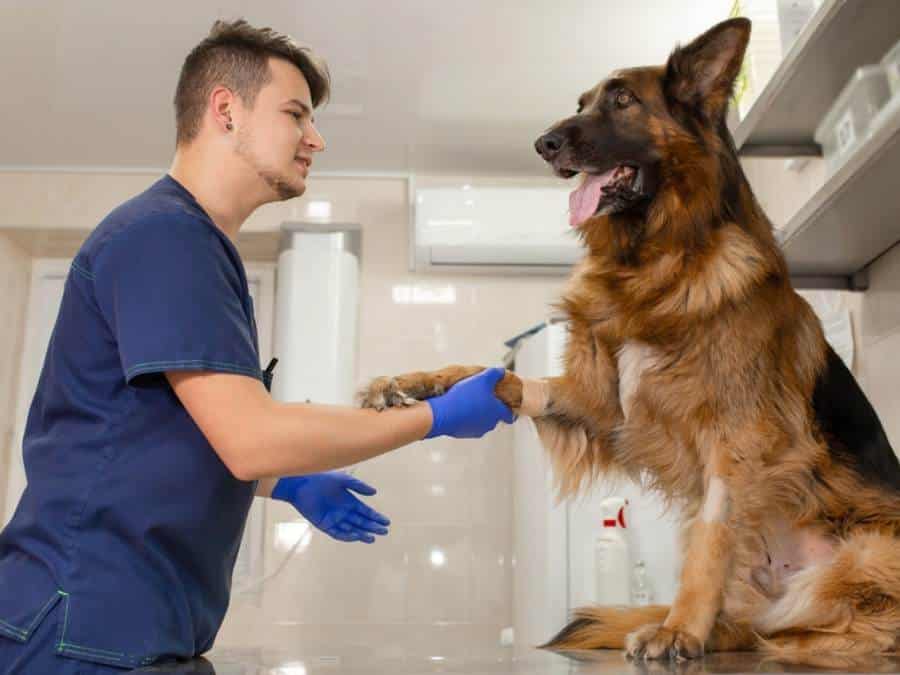German Shepherds have an average lifespan of 9-13 years, which is relatively long compared to other large dog breeds. However, with proper care and attention, you can ensure that your beloved canine companion not only enjoys a happy and healthy life but also potentially extends their years with you.
In this article, we’ll explore seven essential tips that can help increase your German Shepherd’s lifespan, ensuring many more joyful moments together.
Let’s dive in!
How Long do German Shepherds Live?
The average lifespan of German Shepherds is 9 – 13 years, depending on their weight and the amount of exercise they get. Some can live up to 15 years or more with good nutrition, exercise, and regular health checkups. German Shepherds are considered to be seniors at 7 – 8 years of age.
The dog’s size and breed play an important part in their life expectancy, with smaller breeds usually living longer than larger breeds.
Larger breeds live shorter lives, so they mature more quickly. Giant breeds such as Great Danes are usually considered to be ‘seniors’ by the time they’re five, while small and toy breeds such as toy poodles reach seniority around the age of 10.
Scientists have yet to figure out why large-breed dogs tend to mature and age faster than smaller dog breeds. (Source)
Tips to Increase Your German Shepherd’s Lifespan
Increasing the life expectancy of a German Shepherd involves a combination of proactive care, proper nutrition, regular exercise, and a supportive environment. Here are some tips to help enhance the lifespan of your German Shepherd:
1. Maintain a healthy weight
Maintaining a healthy weight is crucial for increasing the lifespan of German Shepherds. Obesity in dogs, like in humans, can lead to a multitude of health problems, including joint issues, diabetes, heart disease, and a shortened lifespan.

German Shepherds are naturally active and energetic, but overfeeding or lack of exercise can easily lead to weight gain.
By providing them with a balanced diet tailored to their specific nutritional needs and ensuring they get regular exercise, owners can help their German Shepherds stay at a healthy weight.
This not only reduces the risk of obesity-related health issues but also promotes overall well-being, mobility, and ultimately contributing to a longer and happier lifespan.
A study published in the Journal of Veterinary Internal Medicine compared the lifespans of more than 50,000 adult dogs from 12 different breeds, including the German Shepherds. The researchers found that the healthy weight dogs of each breed had a lower risk of death over time (and thus a longer lifespan) compared to their overweight counterparts.
Another study on 48 Labrador retrievers found that the lean dogs lived on average 18-24 months longer than their littermates who ate more over their entire lives.
A healthy male adult German Shepherd should weigh between 70 – 88 lbs, while an adult female GSD should weigh between 60 – 70 lbs. so it’s essential to manage their calorie intake accordingly.
You can refer to this German Shepherd Male & Female Weight Chart to better understand how much your dog should weigh at a certain age and point in his/her life.
Click here to calculate how many calories your dog should be consuming in a day.
2. Feed them a high-quality diet
Feeding a high-quality diet is paramount for enhancing the lifespan of German Shepherds.

Opting for a diet composed of premium ingredients, free from fillers, artificial additives, and unnecessary preservatives, ensures that German Shepherds receive the essential nutrients their bodies require for optimal health and longevity.
High-quality diets are formulated to meet the specific nutritional needs of German Shepherds, providing the right balance of proteins, carbohydrates, fats, vitamins, and minerals.
Such diets support healthy growth, maintain muscle mass, promote proper digestion, and strengthen the immune system, thus reducing the risk of common health issues and enhancing overall well-being.
Check out this German Shepherd Feeding Chart By Age to learn more about what and how much to feed your dog to keep him/her young and healthy.
3. Regular exercise and mental stimulation
Regular exercise and mental stimulation are vital for promoting a longer life for German Shepherds. This active breed requires daily physical activity to maintain their physical fitness and prevent obesity-related health issues.

Ensure your German Shepherd gets at least two hours of exercise daily to maintain optimum health and longevity.
Engaging them in mental exercises, such as puzzle toys or obedience training, helps keep their minds sharp and wards off boredom.
To keep your dog’s brain young, you should try to teach them something new regularly.
It could be teaching your German Shepherd how to roll or maybe you want to remind him of tricks he learned when he was younger, make sure to spend some time every day teaching him and rewarding him for his progress and effort.
This German Shepherd Training Guide has 30 training commands that you can start teaching your dog today.
4. Neuter or spay your dog only at the right age
Neutering or spaying a German Shepherd at the right age can play a significant role in increasing their lifespan.
In a paper published by postdoctoral associate, Jessica Hoffman at the University of Georgia, over 40,000 sterilized and reproductively intact domestic dogs were studied and it was found that spayed and neutered dogs live longer than intact animals.
Timing is crucial, as performing the procedure too early or too late can impact their health and longevity.
Neutering or spaying at the appropriate age, typically between six months to one-year-old, can help prevent certain reproductive-related health issues, such as uterine infections and testicular cancer.
Additionally, spaying females before their first heat cycle can significantly reduce the risk of mammary tumors.
It is crucial to consult with your veterinarian to determine the optimal time for neutering your German Shepherd.
RELATED: Neuter or Spay Your German Shepherd: Timing, Pros & Cons
5. Make sure they get routine veterinary care
Regular veterinary check-ups are vital for increasing the lifespan of German Shepherds by allowing for early detection and management of potential health issues.

These check-ups enable veterinarians to assess the dog’s overall health, monitor for signs of illness or disease, and provide preventive care such as vaccinations and parasite control.
Through routine physical examinations, veterinarians can identify any abnormalities, such as changes in weight, mobility, or behavior, which may indicate underlying health concerns.
6. Keep their teeth clean
Taking care of their oral health is crucial for the overall well-being of German Shepherds, especially when it comes to preventing periodontal diseases caused by bacterial infections.
These infections can gradually spread from their mouth to other vital organs like the lungs, heart, and kidneys through the bloodstream, ultimately reducing their life expectancy by 2 years. (Source)
To ensure your German Shepherd’s health and longevity, it is important to make a habit of cleaning their teeth daily using specialized dog toothpaste.
Additionally, providing them with healthy chew toys and bones can also contribute to maintaining their dental hygiene.
7. Genetic health screening
If you are considering getting a German Shepherd puppy, choose a reputable breeder who conducts genetic health screenings to minimize the risk of hereditary conditions.
By conducting genetic testing, breeders and owners can gain valuable insights into the dog’s genetic makeup, allowing them to make informed breeding decisions and implement preventive measures to manage or mitigate identified health risks.
Screening for common genetic disorders in German Shepherds, such as hip dysplasia, degenerative myelopathy, and certain types of cancers, enables early detection and intervention, potentially preventing the onset or progression of these conditions.
For more information on choosing a reputable German Shepherd breeder, read my article How to Buy a German Shepherd Puppy.

Health Issues that May Impact German Shepherd Lifespan
Like any other breed, German Shepherds can be susceptible to various health issues. Understanding these common health concerns in German Shepherds can help owners recognize potential health issues and take necessary precautions to prolong their GSD’s lifespan.
- Hip Dysplasia: A hereditary condition where the hip joint doesn’t develop properly, leading to arthritis and mobility issues.
- Degenerative Myelopathy: A progressive disease affecting the spinal cord, leading to hind limb weakness and paralysis.
- Bloat (Gastric Dilatation-Volvulus): A life-threatening condition where the stomach fills with gas and twists on itself, cutting off blood flow.
- Exocrine Pancreatic Insufficiency (EPI): A condition where the pancreas fails to produce enough digestive enzymes, leading to malnutrition and weight loss.
- Allergies: German Shepherds can be prone to skin allergies, which may result in itching, skin infections, and discomfort.
- Panosteitis: A condition causing inflammation of the long bones, leading to lameness and pain, particularly in young German Shepherds.
- Hemangiosarcoma: A type of cancer that commonly affects German Shepherds, often involving the spleen, heart, or liver.
- Epilepsy: German Shepherds can be predisposed to seizures, which may be genetic or caused by other factors.
- Hypothyroidism: A thyroid disorder that can lead to weight gain, lethargy, and skin problems.
- Heart Disease: German Shepherds may be susceptible to various heart conditions, including valve disorders and cardiomyopathy.
Managing these health issues through preventive care, regular veterinary check-ups, proper nutrition, exercise, and early intervention can help improve the lifespan and quality of life for German Shepherds.
Regrettably, German Shepherds may also face untimely deaths due to accidents and trauma. Car accidents are a common risk, especially when they wander off-leash or escape from their homes. Falls from heights or mishaps during play can result in serious injuries or fatalities.
Additionally, engaging in fights with other animals or sustaining injuries during rough play may also lead to tragic outcomes.
RELATED:

FAQs
Can a German Shepherd live 20 years?
Yes, according to Oldest.org, a 23-year-old female German Shepherd named Zeynep is still alive and active. However, it’s generally uncommon for German Shepherds to reach such an advanced age, with most typically living between 9 to 13 years, occasionally up to 15 years.
Do female German Shepherds live longer than males?
According to this recent research, female German Shepherds tend to have a slightly longer lifespan than males. This is often attributed to factors like hormonal differences and variations in genetic predispositions to certain health issues.
Why do German Shepherds have a short lifespan?
Several factors contribute to their relatively shorter lifespan, including genetic predispositions to certain health conditions like hip dysplasia and degenerative myelopathy, as well as the breed’s size, which can lead to joint problems and other health issues over time. Additionally, environmental factors and overall healthcare play significant roles.
Conclusion
In conclusion, understanding the lifespan of German Shepherds is crucial for prospective owners and enthusiasts alike. While the breed’s average lifespan typically ranges from 9 to 13 years, with some exceptional cases reaching up to 15 years or more, it’s essential to prioritize their health and well-being throughout their lives.
Factors such as genetics, diet, exercise, preventive healthcare, and environmental enrichment all play significant roles in determining the longevity and quality of life of these beloved companions. By providing proper care, attention, and love, German Shepherd owners can help ensure that their furry friends live long, happy, and fulfilling lives.
FURTHER READING:




